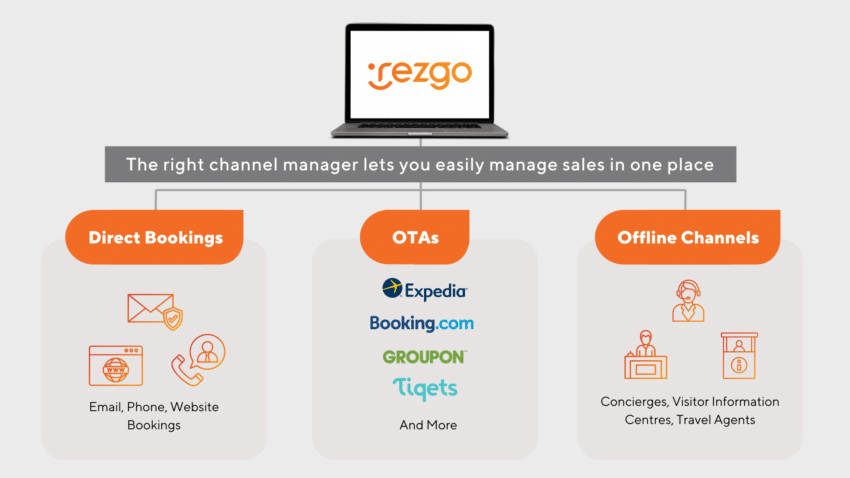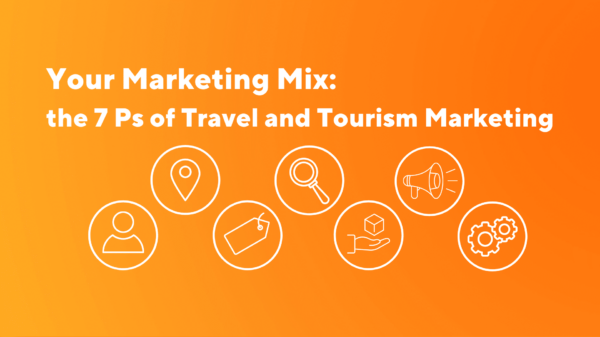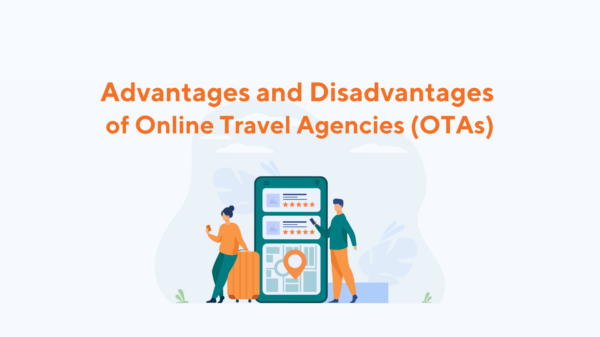Selling tours through your website directly to customers is just one way for you to reach your audience and generate business. Successful tour operators also sell their tours and activities and take bookings indirectly through third party resellers and distributors. Each of these other ways for someone to book one of your tours is known in the business as a “channel.” As you can imagine, the more indirect channels you have, the more work it is to manage them.
This makes “channel management” an important part of the operations of any successful tourism business. Here’s a quick guide to what channel management is, some of the most important considerations, and how to select a channel management system to automate the work.
What is channel management?

Your sales channels are where your bookings come from. Email, telephone and on-site bookings, as well as your own online booking platform and website, are known as direct channels. They enable you to accept bookings directly from customers. Third-party resellers are known as indirect channels. There are a large variety of indirect tourism sales and distribution channels available to tour operators to promote and sell your offerings to a wider audience. These include everything from in-person channels in hotels or tourism information centers to large online travel agencies (OTAs), such as Viator.
Each channel may have different pricing, inventory availability, booking and payment processes, promotions, and other things that can quickly add up to a lot more work for you when it comes to managing them—unless you stay on top of things.
Channel management is the process of managing all of these disparate channels in as efficient and easy a way as possible. Ultimately, the less time you need to spend managing these channels, the more benefit you get from this strategy. As we’ll see later, this is where a good channel manager or channel management system comes in.
Key distribution channels for tour and activity operators
Before we get to the benefits of channel management software, as well as the ins and outs of choosing the best one for your needs, let’s take a look at some of the most important distribution channels for tour and activity operators.
While you will no doubt be familiar with OTAs, which are certainly an important channel, it’s important to not get too reliant on just one distributor or type of channel. Having a variety of channels can help you weather any storms. For example, some recent research on tour bookings during COVID found that:
“… [direct] website sales grew to 75.8% during COVID and on-site sales via POS dropped to 12.3%. Another thing to note is the drastic reduction in sales through 3rd party channels like OTAs. They went down from 14.1% pre-COVID to just under 3% during the pandemic.” (Source: Regiondo)
Online channels

Online travel agents (OTAs) are a key channel for tour operators. They enable travelers to use the internet to search for, compare, and book everything from flights and hotels, to tours and car rentals. OTAs like GetYourGuide and Expedia attract millions of visitors every day because of their convenience, price and product comparison capabilities, and their huge range of hotels, tours, and other travel services and activities.
They offer a number of specific benefits:
- Expand your reach: OTAs are hugely popular for a variety of reasons, including price comparison, deals, and convenience. This popularity and reach enables you to put your tours and activities in front of considerably more travelers than you could through your own website.
- Create marketing efficiencies: If you have a limited marketing budget, OTAs can be a cost-effective way to reach a much larger audience.
- Increase low season bookings: If you experience a downturn in sales during the low season, listing your tours on an OTA lets you piggyback their marketing efforts—at a time when you may need to reduce your costs.
- Gain invaluable insights: When you list your tours on an OTA, you may receive access to the analytics and data insights generated by the platform.

Read our article Advantages and Disadvantages of Online Travel Agencies (OTAs) for more insights. As you can imagine, the more OTAs you work with, the more important channel management becomes.
OTAs aren’t the only indirect online channels. Official tourism websites can also be a great place for people to discover your tours.
Offline channels
While online sales channels are obviously important, successful tour operators use a mix of online and offline channels. Offline tour distribution channels include many ways to book travel and activities that existed long before the internet came along. Three important offline channels are:
Brick and mortar travel agents: Some travelers still prefer an in-person booking experience. These travel agents often act more like a personal travel planner for people planning a trip.
Hotels: Working with traditional hotel concierges can be a great way to sell activities to people in your destinations. It’s a good way to bring in more last-minute bookings in particular.

Tourism information booths and visitor centres: Many travelers make a beeline for the nearest visitor centre when they arrive at a destination. They may want to do something that day or plan out their entire vacation. Either way, they are an important channel for promoting your activities and tours.
Choosing your channels involves answering a few key questions, such as:
- Does the channel’s target market align with who my ideal customers are?
- Is the channel a good fit in terms of its brand image?
- How can this channel help me sell more tours and activities?
- Can this channel help me make inroads into a new market?
- What type of commission will I need to pay to sell my tours through this channel?
- How easy will this channel be to work with?
What is a channel manager?

A channel manager is a digital tool that enables you to bring all of your online and offline distribution channels into one place. It is software that connects and “talks” to all of your channels, acting as a convenient single source of information for your distribution channel network.
It gives you a big picture overview of all of your channel activities and lets you drill down to view and manage individual aspects of each channel. This could include:
- Tour and activity inventory
- Marketing assets and content
- Booking terms and conditions
- Rates
- Sales promotions and deals
- Commissions
- Reports
So, how does it do all this? Without getting too technical, your channel manager uses an API (or Application Programming Interface). That’s just a fancy name for a line of communication that lets your system talk to all of your distributors’ systems. It enables you to automate the process of giving multiple channels what they need from you to resell and market your tours, and makes it easy to monitor and manage everything to do with your distributor relationships.
Benefits of a channel management system
A channel manager is a powerful tool for you to grow your tour operator business. It makes it easy to implement a channel management strategy to expand your reach and boost your bottom line. Here are a few of the specific benefits to your tourism business:

Expand into more channels: Because a channel manager makes working with channels so quick and easy, you have more capacity to expand into new markets and reach new customers through new channels.
Automatically update your inventory in real-time: Instead of manually contacting and updating each channel one by one, you can automate the whole process of updating inventory availability, pricing and other tour or activity details.
Save money, time and effort: Automated channel management removes all of the time effort—and costs—associated with managing spreadsheets, contacting distributors by phone or email or answering their questions and requests for information. And no more manually updating your tour and activity details on an OTA’s website. An automated process also reduces the risk of human error, which can affect your reputation.
Avoid overbookings: When you are promoting tours and activities through multiple channels, there’s a risk of overbooking. With a channel manager, your inventory is automatically updated when a booking is made.
See everything in one place: Digital channel managers let you see and manage everything from one central dashboard. You can generate reports and make data-driven decisions in real-time.
Even your direct channels, like web, phone and on-site bookings, can benefit from being integrated into a good channel manager. It ensures your availability is always up-to-date and your bookings are in good shape, no matter where they come from.
Hopefully by now you’re sold on the benefits of using channels to build your business, and the need for a channel manager to make managing all of your channels a breeze. Here are some pointers for choosing a good one.
What to look for in a channel management system
Effective channel managers deliver all of the above benefits and more. Features to look for include:
- Real-time booking availability shared between all channels, including OTAs and resellers, to avoid overbookings
- Integration with different OTAs to let you work with your preferred OTAs
- Support for offline channels, such as concierges, including features like user management and commission and referral tracking
- The ability to quickly and easily share your inventory directly with resellers, so they can sell to their audience
- The ability to set custom pricing for various distributors, with net-rate and commission support
- Easy access to sales data, trends, analytics and customer data to help you make data-driven decisions
- Implementation and ongoing support and training for users
Whether you maintain a complex system of vendors and resellers or you want to try out some new distributors, channel management through Rezgo means that you can manage all of your channels from one central dashboard—wherever your bookings come from, and whenever they come in.





